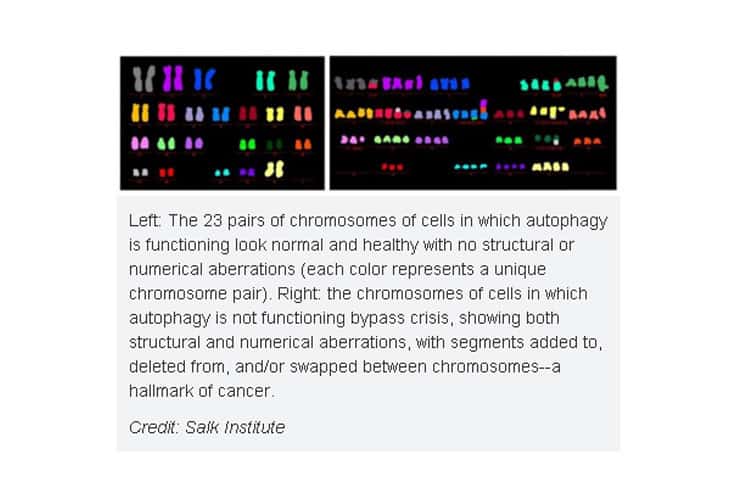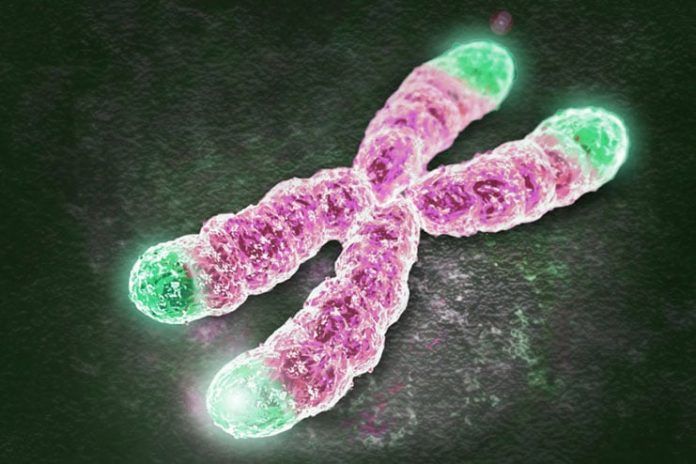Affiliate Disclaimer
Some links in this article are affiliate links. We may earn a small commission if you make a purchase through these links, at no extra cost to you. We only recommend products we find useful to our readersCancer has been a prevailing problem in the current time now, one that is affecting every 2 people out of 10. While majority of the doctors are insinuating the current lifestyle choices as a common reason behind the same, it is believed that there could be something more to it. The cellular process in the body is often considered responsible for a lot of impacts.
A new study (R), conducted by the researchers from the Salk Institute has made some connections with the telomeres as a possible mode of cancer treatment. They found that one of the most common cellular processes in the body, Autophagy actually does promote cell death which is believed to prevent the cancer initiation in the body.
The scientists have found that the molecular tips of the chromosome, also known as telomeres do play quite an important role in the preventing the risks of cancer. The lack of telomere has been associated with the induction of cancer.


The study highlights the cellular process of Autophagy as a potent novel suppressing pathway. Although the efficacy of the same has been highlighted, there still needs to be more in-depth research on the same for better outlook.
Jan Karlseder, a professor in Salk’s Molecular and Cell Biology Laboratory, who is also the senior author of the study, further stated saying that the findings were a complete surprise for them. He further went on to say that although there are multiple steps and factors that prevent the unprecedented division of the cells, causing cancer, they didn’t expect autophagy to be one of them.
Every time cells in the body duplicate their DNA material to grow and divide, the telomere grow a bit shorter in length. They are often times when the telomeres grow so short that it loses the capability of protecting the chromosomes. This is what acts as a trigger for the cell to stop dividing permanently.
Although, there are often times when the cells don’t get the signal to stop dividing when there is a cancer causing virus or other agents inhibiting the process. What this does is makes the cells grow and divide in an uncontrollable manner. When there is a missing or almost non-existent telomere to protect the chromosomes, the body goes into a state of crisis which ends up making the chromosome fuse and then become dysfunctional which is the basis for the induction of cancer in the body.
With this finding along their way, Karlseder and his team wanted to focus and emphasise more on the prospects of this and find out the mechanism involved. Crisis results in unprecedented cell death which could be crucial in warding off the pre-cancerous cells which was something that the researchers wanted to dig more into.
Joe Nassour, a postdoctoral fellow in the Karlseder lab who is also the first author of the paper stated that the scientists thought that the cell death during crisis was believed to be because of apotosis but no one necessarily dug deeper to find if that was actually the case or not.
In order to learn more about this, Nassour and Karlseder both worked collaboratively on the healthy human cells on which they did run a series of experiments. In this, they compared the functions of the normal and healthy cells with that of the ones forced into crisis. They did the same by disabling the growth limiting genes which resulted in shortened telomeres with every division.
Following that, they wanted to know which cellular process was predominantly responsible for the major cell death during the process of division, either apoptosis or autophagy. While both of these processes did have their fair share contribution, autophagy was found to be the dominant one amidst the two.
Once with that confirmed, the researchers wanted to find what happened if they removed the process of autophagy altogether. They were astonished to notice that removing this process made the cells replicate tirelessly without a halt. Also, the cells involved during that phase were found with severe DNA damage which was further worse. This was indicative of the fact that autophagy was actually an important early cancer suppressing mechanism.
The team also tested out the impacts of the process of cell death in cells with damaged DNA, especially around the end of the chromosomes around the telomeres, some had damage around the middle too. The cells which lacked the telomere activated the process of autophagy while the other ones opted for apoptosis. This itself should be more than self explanatory that apoptosis is not the only mode of cell death of the precancerous cells caused due to DNA damage. There is a direct link between the telomere with the cellular process of autophagy.
The study highlights autophagy as a potent method of safeguard against the unprecedented growth in the body. Without the process of autophagy, there are chances for the cells to enter into a state of crisis with unchecked growth along with consistent DNA damage which then leads to cancer. This study focuses more on the cellular process as a mode of novel treatment for something as dangerous like that of cancer. There needs to be more studies on the same for a better and clearer picture about everything.































